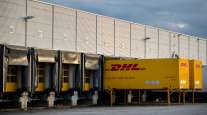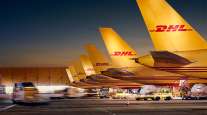Senior Reporter
DHL Express Opens Atlanta Cargo Facility

[Stay on top of transportation news: Get TTNews in your inbox.]
The world’s busiest airport is getting more cargo.
DHL Express on July 6 opened an $84.5 million, 100,000-square-foot hub at Atlanta’s Hartsfield-Jackson International Airport, which the company says establishes direct connections between Atlanta and 19 cities in the Southeast and key global markets, including Europe. Eventually, the facility will operate flights to Hong Kong, Mexico, the United Kingdom and Puerto Rico.
Deutsche Post DHL ranks No. 3 on the Transport Topics Top 50 list of the largest global freight companies. DHL Supply Chain of Westerville, Ohio, ranks No. 12 on the TT Top 100 list of the largest logistics companies in North America.
DHL said the Atlanta hub will operate as a fully automated facility, equipped with technology capable of sorting up to 20,000 pieces per hour. In addition, it will employ in-house customs brokers and collaborate with on-site U.S. Customs and Border Protection personnel to ensure swift clearance of customer shipments.

Parra
“The new DHL Express Atlanta Hub represents a milestone in our ongoing pursuit of sustainability and technological advancement. It also exemplifies our belief in the power of international trade and recognizes the significance of Atlanta and the southeast U.S. in the global marketplace,” DHL Express Americas CEO Mike Parra said. “By fostering commerce and bridging borders worldwide, this hub not only generates economic growth but also creates job opportunities in Atlanta. We take great pride in contributing to the prosperity of the communities where people live and raise their families.”
DHL says the facility will set the standard in terms of sustainable operations, generating up to 50% of its on-site energy consumption through 65,000 square feet of rooftop solar panels, which the company claims will prevent the release of 380 metric tons of CO2 emissions annually.
Additional energy that is needed is being sourced through renewable energy certificates, guaranteeing zero emissions from electricity consumption. The hub also employs environmentally conscious features such as LED lights, electric forklifts, dock seals and rapid-rise doors, further minimizing its environmental impact.
Shaping a Sustainable Future Together!
We recently launched GoGreen Plus to help our customers reduce their carbon emissions using Sustainable Aviation Fuel (SAF).
Find out more about how GoGreen Plus works: https://t.co/HbZkSzRXk0 pic.twitter.com/ppUqBSZhSX — DHL Express (@DHLexpress) July 5, 2023
In May, a key executive told Transport Topics of plans to meet or exceed its goals of being a zero-emission company by 2050 with its GoGreen Plus program.
“I think when Frank Appel [former CEO of Deutsche Post DHL Group] laid out the vision of by 2050 being a zero-emissions company, it was based on his recognition and admission that as an industry we have to admit we’re polluters,” DHL Express CEO Greg Hewitt said, “that by the very nature of logistics we fly planes, we drive trucks, we pollute the environment. I think we’re hearing from both big companies and small midsize enterprises that sustainability is important to them.”

Hewitt
DHL also recently announced that within the next four years it will begin flying 12 electric-powered, twin-engine regional airplanes, named “Alice,” manufactured by Israel-based Eviation, capable of flying 440 miles and carrying 2,500 pounds of cargo.
DHL says battery technology has improved to the point where the planes can be sufficiently recharged during the time they are on the ramp being unloaded and loaded.
Last September, Eviation conducted a test flight of the airplane, with a successful takeoff and eight-minute flight before landing the single-pilot aircraft. Eviation says eventually battery-powered airplanes will be quieter and cheaper to operate per flight hour compared with light jets or high-end turboprops.

Airport and DHL officials open the facility at Hartsfield-Jackson International in Atlanta. (DHL Express)
When it announced its zero-emission goal, the company said it will have 80,000 electric vehicles or 60% of its worldwide fleet on the road by 2030.
Hewitt believes that by giving DHL’s customers options for how they can reduce global emissions, it improves the chances for success.
“Giving people the option to insert their carbon emissions, giving them a science-based reporting mechanism that they’ll be able to show their shareholders or at least give them some peace of mind, we think is going to be pretty big and pretty important, and we’re excited about that,” he said.
While Hartsfield-Jackson International Airport ranks No. 1 in the world in passenger traffic, it is 13th in the U.S. when it comes to cargo transportation.
The airport also is moving to make its operations more sustainable.
In February its management team presented to the Atlanta City Council its first long-term carbon-reduction policy, and the airport committed to being 100% reliant on renewable and clean energy by 2035 and net-zero emissions by 2050.
To install solar panels at the new facility, DHL had to obtain approval from the Federal Aviation Administration, in part because the panels can cause glare for pilots.
Want more news? Listen to today's daily briefing below or go here for more info:




